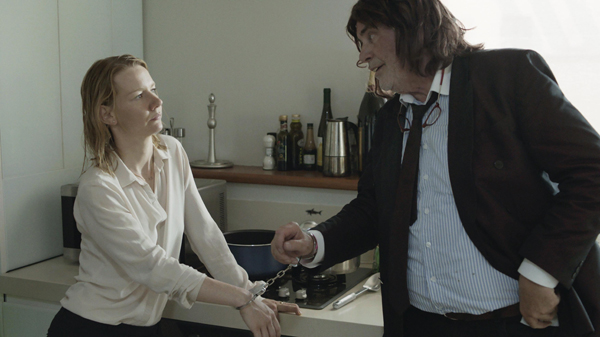An observational, 160-minute-long family drama-cum-screwball comedy took critics by surprise at this year’s Cannes Film Festival. Toni Erdmann, the first (mostly) German film in competition in eight years, seemed to have come from out of nowhere, or at least it was not what the press expected from its director, Maren Ade. She wasn’t exactly an unknown, however, having won the Silver Bear in Berlin back in 2009 for Everyone Else.
The first two hours steadily—and with taciturn touches—reveal the frayed, push-and-pull bond between a father and daughter. A piano teacher without students, Winfried (Peter Simonischek) mourns the loss of his pet pooch and impulsively travels from his German suburb to Bucharest for an unannounced weekend visit to his daughter, Ines (Sandra Hüller).
She’s a mid-30s, no-nonsense management consultant with a long-term assignment to salvage the financial outlook of an oil company. Eliminating thousands of jobs is one of her austerity measures—and make no mistake, the contrast between wealthy Western and poorer Eastern Europeans frequently hovers in the background, to be occasionally glimpsed upon. But for the most part, the film is confined to a five-star bubble, as Ines and her colleagues could be living anywhere with characterless business parks and international chain hotels.
Like a gregarious stand-up comic who doesn’t know he’s been given the hook, Winfried relentlessly tracks Ines down. At one workplace champagne reception, he passes himself off as Toni Erdmann, implausibly claiming to be the German ambassador to Romania. He’s indefatigable, and Ines plays along with his ruses out of embarrassment. Ever the jokester, he tries her patience (and probably the audience’s, too) by popping up everywhere, even a little creepily in her apartment closest. A man of many props, Winfried even whips out a pair of handcuffs and chains her to his side. Not too surprisingly, he forgets the key.
In Winfried’s go-to bag of tricks is a set of false protruding teeth, and as the Toni alter ego, he wears them along with an ill-fitting suit and a disheveled wig, resembling what Michael Keaton’s Betelgeuse would look like 30 years after Beetlejuice’s release. With a drink in hand, Toni comes off as bumbling, loud, out-of-place cousin to Barry Humphries’ grotesque caricature, Sir Les Patterson. Though Toni may not be as uncouth as Sir Les, he does bring his own fart cushion.
From the get-go, viewers immediately have a sense of what drives Winfried and Ines. The characterizations are not exactly subtle, but the director gives her ensemble plenty of room and time to roam: scenes are drawn out, filmed in the ubiquitous art-house long single take. Sometimes obviously, sometimes lightly, each sequence makes its point.
However, just when there seems to be nowhere else to go and the story line is one scene away from turning into a repetitive loop, the director switches gears. It turns out the first 120 minutes were a warm-up, a prelude to a meltdown. It’s as though Ade, who wrote the script, drew upon the fundamentals of farce, rewarding the audience for sitting through an elongated setup with one last act of lunacy. After all, when writing comedy, it’s a good idea to top yourself in the second half and end on a high note.
The film doesn’t manipulate viewers only to leave them laughing. Indeed, the duo’s preceding onscreen history is too complicated for that. There is an underlying melancholia that balances out the cringe-making comedy, especially whenever Ines appears on screen. Though self-confidant and unflappable with colleagues, she appears to be hiding a secret when put on the spot by her father or alone in her high-rise apartment.
That the film did not receive any award bestowed by the jury (led by George Miller) was the single all-out snub of the festival. Its script is layered yet straight-to-the-point and convincing when compared to the Best Screenplay winner, The Salesman, and although there were many multidimensional roles for women at Cannes, none covered the range of behaviors or were as unpredictable as Hüller’s Ines. For that matter, the film has an improvised feel to it, yet the tone remains focused and disciplined.
Fortunately, the film will not be an only-in-a-festival experience. Toni Erdmann will run riot and run its mouth in North America. Sony Pictures Classics is set to release it (date to be determined).







Leave A Comment